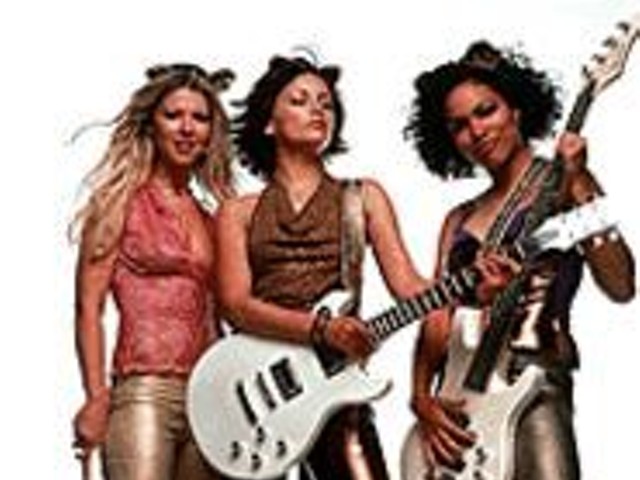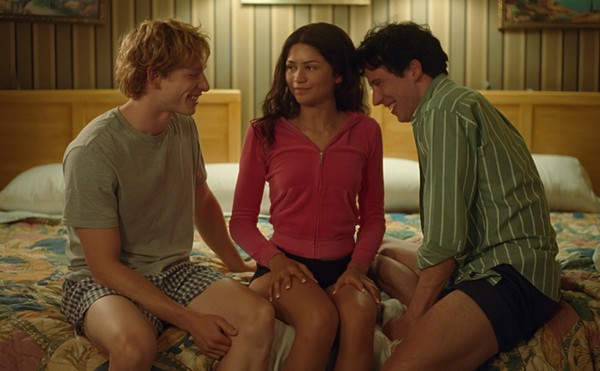There are plenty of good things to say about The Tailor of Panama -- that it is inventive, revisionist and occasionally surprising -- but funny it is pretty much not. Based on the book of the same name by renowned espionage novelist John Le Carré (a master of deception whose real name is David Cornwell), the story is laced with dubious universal truths (chicks dig bad boys; military leaders are nuts; Latin Americans constantly celebrate carnaval) but flounders nonsensically through its moral issues without achieving a satisfying balance. Here we have a world in which infidelity is heinous and unpardonable, whereas kindling professional distrust and engendering civil war are all in a day's work. Perhaps it's best to keep those eyes crossed.
As shifty, ultrarandy British intelligence officer Andy Osnard, Brosnan swaggers through Tailor in what first appears to be a full reversal of his streamlined James Bond image. On closer examination, however, you'll observe what is basically a matured Remington Steele burdened with a boner and a bellyful of vodka, arguably closer in spirit to Ian Fleming's original stud than to the Bond of latter-day cinema. Virile and rude, his smarm outweighs his charm ("I could fuck that," he muses, scoping local delicacies) as he tools around in a mere Toyota, scouring this "nasty web of money lobbying, drug trafficking and corruption" for cash and kicks.
Of course, he's also a professional, which is why he descends on the titular tailor, one Harry Pendel (Rush), who's been craftily covering his checkered past with a fictional future. As a master of fabrication as well as fabric, Harry has gotten himself involved with both Noriega and members of the silent opposition against him, who still bear the scars of the old regime's goon squads. Wearing them outwardly is freedom fighter Marta (French-Chilean actress Leonor Varela, oddly but passionately cast as Egyptian queen Cleopatra in the recent ABC miniseries), who poses as Harry's assistant in his classy tailor shop. More psychically damaged is Mickie (Brendan Gleeson of Boorman's The General), a would-be hero with a tragic streak.
Catalyzing these characters is Andy, who hastily sets himself up with British ambassador Maltby (John Fortune) and subordinate officers Nigel (Martin Savage, who debuted as George Grossmith in Topsy-Turvy) and Francesca (Catherine McCormack of Braveheart). He also gradually blackmails Harry to garner information from his own ludicrously loving wife, Louisa (Jamie Lee Curtis), who, while defending the newly transferred canal from Washington's "bunch of rabid right-wing senators," has somehow managed to finagle her way into the top ranks of Panamanian politics. Because she's too uptight to succumb to more than a hasty grope during Andy's tactless advances, the spy seeks other means to get himself both shaken and stirred, including a preposterous tryst with the initially icy Francesca (not that their coupling isn't uniquely zesty; apparently the actors had only met slightly before performing their literal and metaphorical tango).
Strangely, however, the strongest -- and most coyly underplayed -- notes of sexual tension come from Andy and Harry, who sort out their needs and differences in peculiarly intimate settings. Once Andy breaks the ice with liberal doses of phallic humor (which the script generously echoes in case we miss them the first time), the two men carry out their clandestine meetings in the unlikeliest of places. Two of the more jarring and amusing scenes have them jiggling together on a bordello's vibrating bed and dancing together in a gay bar. It's as if Boorman and Le Carré are trying to get something off their collective chest -- Andy and Harry are codependent sides of the same coin, in essence the feral and the familial -- but their duality merely wafts through and disappears like equatorial mist.
There are other suggestive bits woven through that, though interesting, tend to be eclipsed by the hope and glory of this first major film to be shot in Panama (except, of course, for the copious interiors filmed in Ireland). For instance, Harold Pinter appears as Harry's dead uncle, representing the tailor's largely unheeded conscience and common sense, but the celebrated playwright's appearances are sparse and strangely pedestrian, nothing to get worked up about. Likewise, Daniel Radcliffe (the boy who will play Harry Potter) appears as Harry's inconsequential son (a.k.a. "set dressing"). To similar effect, the director's own progeny, Lola Boorman, steps in for no apparent reason as Harry's young daughter. Oh well, at least it beats being raped in Dad's film, as was Katrine Boorman in Excalibur.
This is a white person's movie set against a brown backdrop, but all the talent rise to the occasion to present a world in flux as the nations of the world cluster around Panama's vital waterway. The movie zigs and zags about to suggest great cultural complexity, sometimes leaving Brosnan out for a few scenes at a time. When he is onscreen, deadpanning lines about "dark and lonely work, like oral sex, but somebody has to do it," his dry wit nicely complements the humid air. The main complaint is addressed to his counterpart; although it's probably illegal to say so, Rush grows wearisome as he hogs the camera and brays about the integrity of his craftsmanship or whatever.
Still, what's most unnerving about The Tailor of Panama is the film's overall tone, which wavers uncomfortably between modest thrills and modest farce. There's virtually no action and nary a cloak nor dagger in sight, and yet the package is labeled "spy thriller." It's curiously light fare for Le Carré -- and for Boorman -- scraping for tension rather than drowning us in it.





